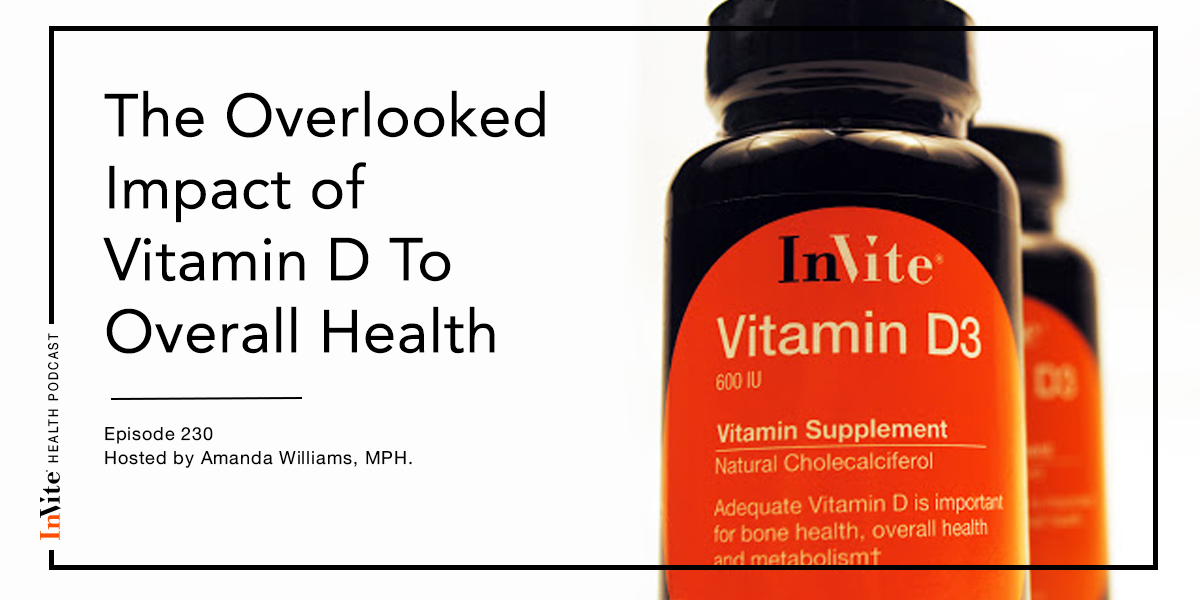The Overlooked Impact of Vitamin D To Overall Health – InVite Health Podcast, Episode 230

vitamin d
Invite Health Podcast, Episode hosted by Amanda Williams, MPH.
Subscribe Today!
As of a few years ago, many people would think of Vitamin D simply as our bone health vitamin and not really understand all of the other things that Vitamin D is doing to maintain our health. I want to talk about that in some specifics today because I think it’s important being that we are still in the midst of this pandemic and there have been so many different studies that have come out looking at the analysis of Vitamin D levels among asymptomatic as well as critically-ill COVID-19 patients. I do think that there is a strong correlation between Vitamin D status and the actual severity of COVID-19 infections. I want to talk in detail about what Vitamin D can do for the body besides supporting bone health.†
The important functions of Vitamin D
We know that when it comes to bone mineralization, we require Vitamin D. This is in conjunction with things such as calcium, phosphorus and other minerals within the bone to maintain that bone density. But we know that this vitamin actually exhibits many non-skeletal effects throughout the human body, especially on the immune system, as well as the endocrine and cardiovascular systems. If we are taking Vitamin D in from our foods, just to maintain normal bone development and the maintenance of our bones, we have to consider if we are getting enough. This is why, as a whole, most people have either an insufficiency in Vitamin D or an actual deficiency in Vitamin D. It is estimated that over 1 billion people globally are impacted via vitamin deficiencies.
Tune into the full podcast episode for more information on deficiencies.
Vitamin D helps to regulate cell differentiation. This refers to the way that your cells are actually dividing. This is done by binding to the vitamin receptor found in most cells throughout the body. That should clue you in that Vitamin D is highly unique. Your vitamins don’t have receptors throughout the body, but this vitamin does, which is why we know it plays more of a hormonal role in the body as it does an actual role like a typical vitamin. Observational studies have shown this association between low levels and an increased risk of developing things such as colorectal cancer and breast cancers. We cannot overlook just how significant the impact of Vitamin D is on our overall health.†
Other observational studies have looked at the association between it’s status and the susceptibility or the severity of different illnesses and autoimmune conditions, such as diabetes, rheumatoid arthritis, Lupus and multiple sclerosis. There is adequate evidence out there now that directly links this inverse relationship between low levels of circulating vitamin and the increased risk for the severity of these types of autoimmune conditions.†
THE IMPORTANCE OF VITAMIN D FOR STRENGTH AND MOBILITY – INVITE HEALTH PODCAST, EPISODE 158. Listen Now >>
There are trials out there investigating whether Vitamin D is linked with cognitive decline, even in the setting of Alzheimer’s disease and dementia, as well as other neurodegenerative diseases. We know that there is this inverse relationship between circulating levels and glucose tolerance. When we look at things like insulin resistance, for example, in the setting of metabolic syndrome, we have to understand that this vitamin is playing a role in that as well.†
For more information about the important role this vitamin plays in the human body, listen to the full podcast episode.
Thank you for tuning in to the Invite Health Podcast. You can find all of our episodes for free wherever you listen to podcasts or by visiting www.invitehealth.com/podcast. Make sure you subscribe and leave us a review! Follow us on Facebook, Twitter and Instagram at Invite Health today. We’ll see you next time on another episode of the Invite Health Podcast.


